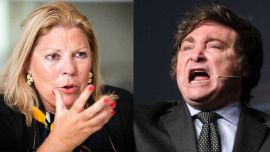Argentina's Economy Minister Martín Guzmán has said the economic plan proposed by the International Monetary Fund as part of a US$40-billion debt renegotiation would derail the country’s recovery.
While Argentina and the IMF are “on the same page” on the level of foreign reserves needed to support the country, they disagree on how quickly the government must reduce its fiscal deficit, Guzmán said Wednesday as he laid out his most detailed vision yet for negotiations with the Fund.
The IMF’s proposal would probably “halt the economic recovery that Argentina is witnessing and is essentially a programme of real spending cuts,” the minister said during a presentation to governors in Buenos Aires, alongside President Alberto Fernández.
“What’s the priority?,” he asked. “For us, the priority is that Argentina continues on the path of recovery. For others, the priority could be different.”
An IMF spokesperson declined to comment.
Guzmán’s tough stance comes at a critical stage in negotiations with the Fund. After two years without concrete progress, Argentina has large payments due to the IMF this year and Fernández has already said the government can’t pay.
“The press conference by Argentina’s leaders on Wednesday looked like an attempt to buy time and convince markets, the International Monetary Fund or the government itself that time and bargaining power is on the country’s side. The tone from President Alberto Fernández and Economy Minister Martín Guzmán suggests that no deal is imminent," said Adriana Dupita, Bloomberg's Latin America economist.
Lack of support
Without naming countries, Guzmán acknowledged that Argentina doesn’t have enough international support at the IMF to reach a deal.
“What we have is support of part of the international community but not all of it,” he said. “That’s the reason why there isn’t yet an agreement on this fundamental point, which is the fiscal issue.”
Guzmán detailed the technical steps of the negotiations in a series of charts showing projections based on Argentina’s proposal for the primary fiscal deficit, monetary financing and international reserves. He said Argentina and the IMF agree that Central Bank’s reserves should grow between US$3 billion and US$4 billion a year. However, Guzmán didn’t provide precise numbers on the fiscal deficit or monetary financing.
Argentina owes the IMF US$2.8 billion in March, a payment many analysts see as a deadline to reach a deal considering the Central Bank’s thin reserves. Some economists became more pessimistic about that deadline after watching Guzmán on Wednesday, noting that he made no mention of improving Argentina’s business climate.
“The odds are rising every day that they will not have a done deal by the time the March payment comes due,” says Arturo Porzecanski, an economics professor at American University in Washington. “The impression I get is that the negotiations are stuck because the Fund is seeking a greater fiscal effort.”
Lack of support at home
The presentation itself stirred up controversy before it began. Opposition leaders didn’t attend, labelling the forum a “political meeting” that shouldn’t be held at the presidential palace, but instead in the legislature. The lack of participation from the opposition bloc doesn’t bode well since the IMF said in December that the future programme needs “broad support” within Argentina.
The debt stems from a record bailout the Fund gave to Argentina’s previous government in 2018 that failed to stabilise the economy. Guzmán referred to the IMF’s recent evaluation of that programme and criticised the institution for focusing too much on rebuilding market confidence and not the real economy.
In the 2018 deal, “the focus was on reestablishing market confidence,” he said. “Of course, we’re working so that there’s more market confidence but the first thing above all is to improve the real economy’s situation.”
related news
by Patrick Gillespie & Ignacio Olivera Doll, Bloomberg





















Comments